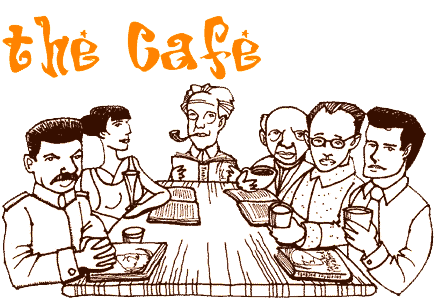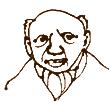
Click on the names of Ehrenburg's "cafe mates," and see what they have to say about Tangled Loyalties.
Ilya Ehrenburg was famous for the time he spent reading and writing in Parisian cafes. In 1911, he was among the original habitues of the Rotonde Cafe at the corner of the Boulevard de Montparnasse and the Boulevard Raspail near the Latin Quarter. He actually met Picasso, Modigliani, Chagall, and a host of other famous artists and writers there. In the 1920s and 1930s, he switched his allegiance to Le Dome or La Coupole, where he often held court with other writers and journalists. This Cafe Scene is an homage to that faraway time and place.




I never expected to learn so many useful and complex details about someone whose life and career intersected with mine for over 40 years. He was one of he first critics to praise my poetry as long ago as 1920, before we even met. During World War II, I admired his outspoken articles against the Nazis and wrote to him twice from Tashkent to seek his help. How did Rubenstein find those letters? After Stalin died and my son Lev Gumilev was still a political prisoner, I sought Ehrenburg’s help. He appealed directly to Nikita Khrushchev, but Lev was not released until 1956. I do think that Ehrenburg’s letter made a difference.


I followed Ehrenburg’s career more closely than anyone. My agents recorded his conversations, even in Paris where I allowed him to live for many years. When Hitler was our enemy, I knew I could counton Ehrenburg’s loyalty, even when I got rid of his friends Bukharin, Mandelstam, and Babel. Ehrenburg mastered the art of silence. But Rubenstein has taught me things I did not know. Even before Khrushchev denounced me in 1956, Ehrenburg wrote his silly little novel The Thaw. Soon the whole country adopted those words, the thaw, as if life under me had been dark, gloomy, cold, 25 years of winter. If I had known half the material that is in Tangled Loyalties, Ehrenburg would not have survived. He would have enjoyed the hospitality of my jailers.


I knew Ehrenburg for more than fifty years. I saw how he transformed himself from a down-and-out poet into an eloquent journalist, just as Rubenstein tells us. It’s also true that Ehrenburg encouraged me to join the Struggle for Peace and participate in the Soviet peace campaign after World War II. Most of all, though, I’m grateful to Josh Rubenstein for recalling how Ehrenburg organized the first exhibit of my work in the Soviet Union – that was in 1956. Only Ehrenburg could have pulled it off.


We knew each other for barely twelve years. He was always one of my staunchest defenders, even when the literary establishment was hounding me for not publishing anything in the 1930s. Ehrenburg said that some writers write like rabbits. Others, like me, resembled elephants. After my arrest in 1939, Stalin’s secret police tortured me and made me implicate Ehrenburg as a spy. I was afraid he would be arrested too. Still, his secretary in Moscow was the only person to give money to my wife in Moscow when she was left alone with our daughter. Rubenstein is right to emphasize how Ehrenburg insured my ‘rehabilitation” in the 1950s and championed the publication of my work. Without his intervention, who knows how long it would have taken the Kremlin to allow my name in print again.


Rubenstein got it just right. I met Ehrenburg in the Rotonde Cafe when he was a slovenly, bohemian poet. He always wore a hat with large crown and broad brim. The French liked to call him ‘Le Chapeau.’ During World War I, I saw how Ehrenburg had a nervous breakdown. He missed his homeland, his family. I’ve read Tangled Loyalties, but it still amazes me that Ehrenburg became a world-famous writer and a useful tool for Stalin. None of his friends could have guessed his fate in those years.

I don’t understand how Rubenstein did it. I tried hard to cover up many of my tracks, because under Stalin it would not have been healthy for the Kremlin to know too much about my life. But Rubenstein found material I had forgotten about myself. I also have to congratulate him for grasping that my personal life was just as “tangled” as the life I led as a political actor. I can see from reading Tangled Loyalties that my daughter Irina helped him a great deal, as did a number of other people I was close to in Spain, France, and the Soviet Union. I know better than anyone how difficult it was to live my life. My congratulations to anyone who wants to devote so much time to documenting it!